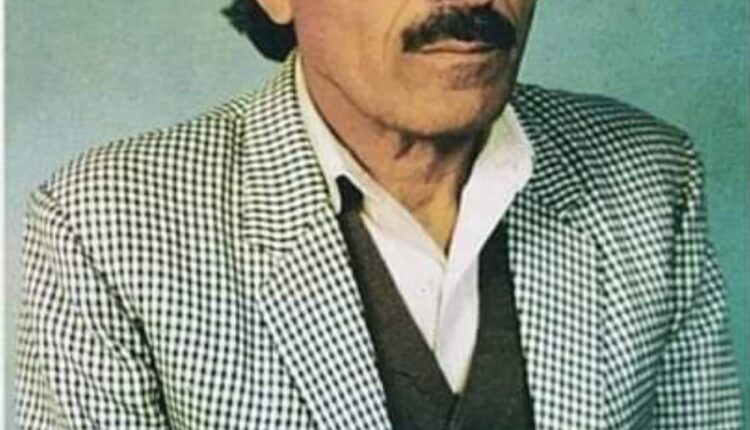Nishat Ansari — A Life in Service of Literature
Rayees Ahmad Kumar
In the vast constellation of poets, authors, and scholars who have shaped the cultural and intellectual landscape of Kashmir, Nishat Ansari shines as a luminary whose legacy continues to inspire readers and writers alike. A poet of rare sensitivity, a critic of depth, and a scholar of great discipline, Ansari’s contributions to Urdu and Kashmiri literature remain unparalleled.
Born on December 23, 1930 (though official records place his birth in 1928), his given name was Gh. Mustafa Ansari, but he became widely known through his pen name, Nishat. Like many of his generation, his early life was marked by modest beginnings. After matriculation, he first joined the Cooperative Department, but soon discovered that his heart was not in official work. His true calling lay elsewhere. He resigned and chose the noble profession of teaching, where for 23 years he nurtured young minds across different schools of the Valley. His students fondly recall not just his command over language and literature but also the warmth with which he guided them—like a caring father. For his devotion to education, the Government of Jammu and Kashmir honoured him with the Best Teacher Award.
Yet, teaching was only one dimension of his remarkable personality. Nishat Ansari was a man of letters in the truest sense—a poet, researcher, critic, translator, and essayist, all rolled into one. Over the course of his life, he authored more than two dozen books. His five poetry collections—Gulnar, Nawan, Ablag, Aokus Boukus, and Souz—earned him acclaim across literary circles. His collection Gulnar won the prestigious Best Book Award from the J&K Academy of Art, Culture and Languages in 1981, a recognition that cemented his place among leading poets of the time.
Major Works of Nishat Ansari
Gulnar (Best Book Award, J&K Academy, 1981)
Nawan
Ablag
Aokus Boukus
Souz
Salsabeel (Urdu translation of Hazrat Sheikh Noor-ud-Din Noorani’s Shruks)
Ansari’s literary genius was not confined to original poetry alone. He made equally significant contributions as a translator and researcher. For the Sahitya Akademi, New Delhi, he wrote research monographs on two towering figures of Kashmiri thought and literature—Prof. Mohiuddin Hajini and Gh. Nabi Dilsoz. Perhaps his most enduring work, however, was his Urdu translation of the sacred Shruks of Hazrat Sheikh Noor-ud-Din Noorani (RA), compiled under the evocative title Salsabeel. In addition, he translated the writings of Dr. Zakir Hussain, India’s former President, and the celebrated poet Jigar Moradabadi into Kashmiri, making them accessible to local audiences. His translation of Dr. Zakir Hussain’s book, published posthumously, won him recognition from the Sahitya Akademi.
Nishat Ansari’s influence extended far beyond the printed page. He remained closely associated with leading cultural and academic institutions, including All India Radio Srinagar, Doordarshan Kendra Srinagar, the Sahitya Akademi, the J&K Academy of Art, Culture and Languages, the University of Kashmir, the Board of School Education, and the National Council for Promotion of Urdu Language (NCPUL). In each of these roles, he left an indelible mark.
But perhaps his most impactful contribution was institution-building. He was the founder of Dayira Adab in Delina, Baramulla, and a foundational member of Adbi Markaz Kamraz, the Valley’s largest and most influential literary organisation. Serving as its General Secretary for nearly three decades, he worked tirelessly to organise literary conferences, preserve records, and bring together voices of diverse backgrounds in celebration of language and culture. His colleagues admired his diligence and dedication, which ensured that Adbi Markaz Kamraz became the backbone of Kashmir’s literary revival.
Institutional Contributions
Founder, Dayira Adab, Delina (Baramulla)
Founding member & General Secretary (3 decades), Adbi Markaz Kamraz
Associated with: AIR Srinagar, Doordarshan, Sahitya Akademi, J&K Academy of Art, Culture & Languages, University of Kashmir, BOSE, NCPUL
As a critic and essayist, Nishat Ansari was equally prolific. He wrote nearly 300 research-based and critical essays that appeared in reputed journals in Kashmir, India, and even Pakistan. Each of these writings reflected his analytical sharpness, balanced judgment, and deep understanding of both Urdu and Kashmiri literary traditions. His autobiography, a detailed narrative of more than 300 pages, is awaited with great anticipation, promising to provide fresh insights into his personal journey and the literary world he inhabited.
On May 25, 2000, Kashmir lost one of its most distinguished literary voices. Nishat Ansari—poet, critic, teacher, and institution-builder—passed away, leaving behind a treasure of writings and an intellectual legacy that continues to guide future generations.
As we remember him today, one cannot help but feel that Nishat Ansari was more than just a poet or critic. He was, in essence, a bridge—connecting the old with the new, the classical with the modern, and the local with the universal. May Allah grant his soul eternal peace and the highest ranks in Jannah.
Recognition
Best Teacher Award, Government of J&K
Best Book Award (1981), J&K Academy
Posthumous recognition by Sahitya Akademi for translation of Dr. Zakir Hussain’s work


Comments are closed.